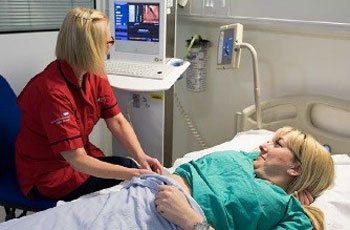The Scarred Liver Project: a new diagnostic pathway to detect liver disease

Deaths from liver disease in the UK continue to rise, which is in contrast to other common causes of death (e.g. heart disease, lung disease and cancer). In the majority of patients, liver disease is preventable and caused by lifestyle-related risk factors such as excessive alcohol use, type 2 diabetes and obesity.
Current strategies to identify liver disease within the community are inadequate. Dr Sonali Kinra, a GP in Nottingham (UK) explains that, ‘The challenge faced in diagnosing liver disease has been that there was only the availability of a blood test, which is called a liver function test (LFTs) and we are aware that it is not the most appropriate test to actually diagnose liver disease’. In the UK, 50% of patients are first diagnosed with liver disease following an emergency admission to hospital with complications from liver failure. These patients have a reduced quality of life, a short life expectancy and expensive associated healthcare costs.
The aim of the Scarred Liver Project was to identify patients with liver disease much earlier. The plan was to allow GPs direct access to specialist tests in the community in order to assess at-risk patients for liver damage. The team was able to challenge practitioners and healthcare organisations about how they thought about these patients and the improvements in the service that they could provide. This step was crucial in order to make progress in changing clinical practice.
The Scarred Liver Project team developed and piloted a new pathway in two GP practices in Nottingham in May 2013 to determine the practicality and success of this new approach.
The pathway had three unique features. These were to:
1. actively identify patients with risk factors for liver disease;
2. use a specialist test (Fibroscan®) in a community setting to assess those at risk, replacing conventional practice; and
3. give lifestyle advice to all patients who attended with signposting to other specialist services as required (e.g. alcohol addiction or weight loss services).
Three other GP practices across the cities of Nottingham and Leicester adopted further pilot studies from 2014 to 2016 to further determine the success of the project within different socioeconomic and geographical areas.
Overall:
- a population of 25,018 adults were assessed, with 3688 patients identified as at risk of liver disease;
- 20% of the patients who attended had evidence of liver disease;
- 39 patients had severe, irreversible liver scarring (cirrhosis). None of these patients had any symptoms.

These results led to the pathway being implemented into clinical practice in September 2016. The Scarred Liver Project team was able to achieve this in partnership with GP colleagues and healthcare commissioners. The pathway is now accessible to more than 100 GP practices across South Nottinghamshire, serving a population of 700,000 people.
Dr Hugh Porter, a local GP and chair of the Nottingham City Clinical Commissioning Group, stated, ‘We completely re-engineered how primary care thinks about liver disease. Liver function tests aren’t the only thing you need to be thinking about.’ As a consequence of this pathway, the team was able to create a more effective alliance between community and hospital healthcare teams.
Since the implementation of the commissioned pathway into clinical practice in July 2020:
- 4187 patients had a specialist test and received lifestyle advice;
- 5.1% (215) patients were identified as having evidence of advanced liver disease consistent with severe irreversible scarring (cirrhosis); and
- an economic evaluation demonstrated that this pathway is cost-effective compared to standard clinical practice.
The impact from an individual patient perspective has, at times, been life changing. Malcolm, a patient who attended the pathway, has gone on to have a liver transplant and stated, ‘The Scarred Liver project has been my lifeline. Seeing how the local healthcare providers worked together to perfect it and roll it out to 700,000 Nottinghamshire patients has been incredible. Fibroscan gave me extra years of normal life.’
The Scarred Liver Project has enabled local healthcare services to radically shift how they diagnose and manage liver disease in Nottinghamshire. However, as Professor Neil Guha states, ‘Pathway design and reiteration is complex and challenging. It requires passionate clinicians that are motivated and credible.’ The Scarred Liver Project team has been fortunate to work with partners who were instrumental in facilitating the adoption of the pathway and assisting the spread in the local area. Engagement of local GPs at face-to-face training events was also important. This gave GPs an understanding of what the team was trying to achieve, but also provided them with feedback in the initial period of rolling out the pathway.
The underpinning research has resulted in over 10 publications across a wide area of disciplines, including clinical diagnostics, epidemiology, systematic reviews and health economics. To facilitate patient and public involvement and promote wider dissemination, the Scarred Liver Project website was launched in June 2017. The pathway has been highlighted as an exemplar of innovation by diverse institutions, including the Royal College of General Practitioners, Kings Find report (2018) and Lancet Liver commission. In 2019, the Scarred Liver Project was a finalist in the National Institute for Health and Care Excellence (NICE) shared learning awards, and winner of the Health Service Journal (HSJ) value awards.
The project has had national and international influence. Professor Guha was invited to join a European consortium, LiverScreen, which was awarded €5.99 million by the European Union in 2019. The project will screen 30,000 individuals across seven European countries, with the aim of implementing the first population-based screening intervention program for chronic liver diseases in Europe. Professor Guruprasad Aithal has also incorporated the concepts of the Scarred Liver Project in a community screening programme in Kerala, India. Over 12,000 patients have had a liver diagnostic in the community and 24 % have readings suggestive of significant liver disease. As the president of the Local Self Government (Anad Grama Panchayat) in Kerala, he explains: ‘The innovation and lessons from the Scarred Liver Project have shaped healthcare related to chronic liver disease in our community’.
Further Resources
www.scarredliverproject.org.uk
Authors:
Prof Neil Guha, Dr Rebecca Harris, Dr Emilie Wilkes, Prof Guruprasad Aithal
NIHR Nottingham Biomedical Research Centre, University of Nottingham and Nottingham University Hospitals NHS Trust

Disclaimers
The views expressed in this this World EBHC Day Impact Story, as well as any errors or omissions, are the sole responsibility of the author and do not represent the views of the World EBHC Day Steering Committee, Official Partners or Sponsors; nor does it imply endorsement by the aforementioned parties.